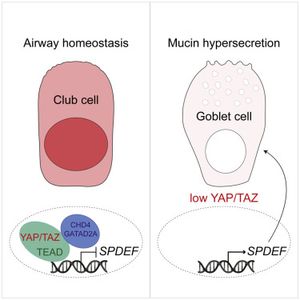The Varelas Lab has published a study in Cell Reports describing important roles for the transcriptional regulators YAP and TAZ, which are key effectors of Hippo pathway signaling, in lung epithelial homeostasis.
The study explored roles for YAP and TAZ in adult lung epithelium and found that conditional deletion of theYap and Wwtr1/Taz genes in animal models led to severe lung damage that included alveolar and bronchial cellular defects. One notable phenotype that was further studied was an aberrant production of mucus secreting goblet cells that resulted from the transdifferentiation of airway club cells with low YAP/TAZ activity.
Goblet cells secrete mucus that normally helps protect the lining of the bronchus and traps microorganisms for clearance. However, aberrant specification of goblet cells leads to defective lung functions that associate with a range of lung diseases (e.g. asthma, COPD, Cystic Fibrosis and chronic bronchitis). Identification of YAP/TAZ as key regulators of goblet cell production offers insight into molecular signals that may dysregulated in such diseases.
Gene expression and chromatin binding analyses from murine and human lung models revealed that YAP/TAZ repress a gene expression network that is important for controlling goblet cell production. Interestingly, altering signals that induce nuclear YAP/TAZ activity was sufficient to block goblet cell production in experimental cell models, suggesting that signals governing YAP/TAZ activity may offer a therapeutic means to restrict goblet cell production in disease.
For full text of the article, click here.